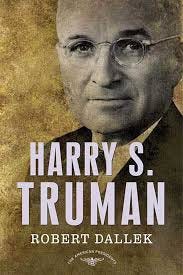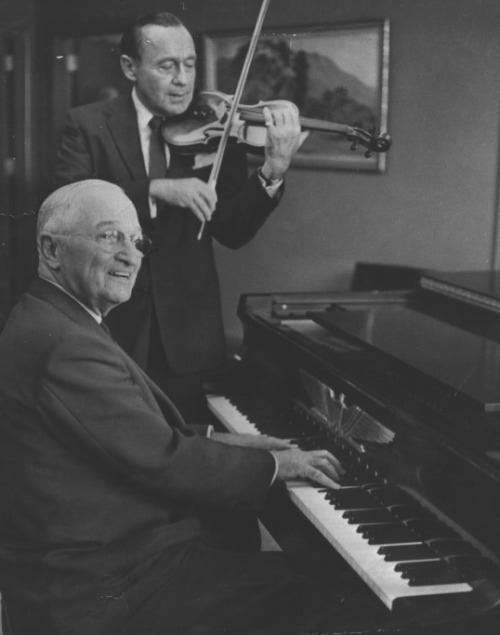The Book, the Man, and the Venue — Harry Truman
Book Review — "Harry Truman: The American Presidents Series" by Robert Dallek
Welcome back to “The Book, the Man and the Venue”, my weekly newsletter that aims to shed light on every U.S. president in a way that is engaging, informative, and hopefully, fun!
Every Monday, I’ll be releasing a new article in which I chronicle my journey through one biography for each U.S. President. Each post will consist of three parts: I’ll offer a brief review of the biography (the Book), share reflections on the president’s character and legacy (the Man), and choose a location where I would spend time with the president if they were alive today (the Venue).
Hopefully, you will find the content both enriching and enjoyable, and if you like what you read, please consider checking out my other articles (and subscribing if you don’t already)!
Without further ado: Harry S. Truman
The Book
I’ll admit, I’ve been eagerly awaiting the chance to read David McCullough’s “Truman” since I began my journey through the annals of U.S. history. Not only is his book often considered the pinnacle of American biography, but I’ve had a special place in my heart for Cold War presidents ever since I studied the era during my sophomore year in college. Unfortunately, it’s with a heavy heart that I must report that, for the sake of time, I was forced to pass over McCullough’s biography in favor of Robert Dallek’s “Truman” from the American Presidents Series.
I’ve come across Dallek several times while planning the biographies to read in my presidential marathon. While he’s probably best known for his work on JFK – which gets rave reviews from Stephen Floyd over at BestPresidentialBios – he’s also written well-received books on LBJ, Richard Nixon, and FDR. So, while I was disappointed not to give Truman the deep dive he deserves, I knew I could rely on the APS and felt comfortable with the quality that Dallek would provide.
In the end, I got pretty much what I was expecting. The book covers the major events of Truman’s life at a high level and moves quickly at the start, with most of the pages focused on his quasi two-term presidency. And what Dallek chooses to cover, he does well. While he leans more on public opinion polls to justify Truman’s decisions than other authors, he adds solid context to explain the political climate and effectively uses Truman’s own words to guide the reader through his thought process. As someone already familiar with Truman’s presidency, I thought Dallek did a great job distilling the key events in a digestible way.
And yet, Dallek’s book contains little of the drama and intrigue of the Cold War that makes studying it so much fun. Harry Truman had a notoriously sharp tongue, but Dallek does little to highlight his personality or help the reader fully understand what makes him tick. Similarly, the book’s length constrains the author so much that he is forced to gloss over Truman’s days in the Pendergast machine and why the Truman Committee was so important. As such, the reader is left with only a limited understanding of how Truman was able to rise so quickly to the Oval Office.
Overall, I’m not mad at the book or the author, but more at myself. Had I procrastinated less in my reading journey, I would have had the luxury of time to delve into a more fully fleshed-out version of the life of Harry Truman. Instead, I chose an option where I knew I’d be underwhelmed. For those of you unfamiliar with Truman or the Cold War more broadly, Robert Dallek’s book is a great place to dip your toes in for an introduction. But for someone like me who had been waiting for this president for a long time, I couldn’t help but be disappointed (David McCullough, our time will come!!).
Rating: 5.1/10
The Man
With the election fast approaching, I thought today’s "The Man" section would be the perfect time to explore what’s considered one of the greatest electoral upsets of all time: the 1948 race between Harry Truman and Thomas Dewey.
In late October 1948, Truman was in a precarious position. Having taken over the presidency after FDR’s death, he was now seeking a term of his own, but most—including the media, political analysts, and pollsters—believed his days in the White House were numbered.
Truman faced challenges not only from Dewey but also within his own party. Strom Thurmond, running as a Dixiecrat, threatened to split the Southern vote, while former Vice President Henry Wallace attracted the left wing. Polls consistently showed Dewey ahead by a comfortable margin, so much so that some polling organizations stopped surveying because the outcome seemed certain.
At that time, however, polling was still in its early stages. The predominant method used was quota sampling, where interviewers selected respondents based on demographic quotas to create a "representative" sample. This approach often introduced significant bias, as interviewers tended to choose people who were easier to reach or more like themselves, leading to an overly optimistic outlook for Dewey.
The influence of these flawed polls wasn’t just confined to public perception—it shaped the campaigns. Confident of victory, Dewey’s camp played it safe, avoiding risks to maintain their lead. Truman, on the other hand, embraced his underdog status and campaigned with tireless energy, embarking on a grueling whistle-stop tour. He spoke directly to the American people, especially targeting undecided voters, with passionate speeches aimed at firing up his base.
As election day neared, Dewey’s win felt inevitable—even the Chicago Tribune prematurely printed its now-infamous headline: “Dewey Defeats Truman.” (Of course, printer issues also contributed to the early printing, but why ruin a good narrative?)
When the votes were tallied, though, the polls and pundits were wrong. Truman hadn’t just closed the gap—he’d won the election, proving that his fiery, last-minute push had struck a chord with voters, many of whom decided in those final days.
I share the details of the 1948 election not just because they highlight Truman’s characteristic tenacity, but also because they remind us that anything can happen in a presidential election. Polls may offer a snapshot of the moment, but they can’t predict last-minute shifts in voter sentiment. Just as in 1948, no one should be shocked if the final weeks of this campaign contain at least one more October Surprise.
The Venue
Out of all the presidents I've studied so far, none seem like a more entertaining hang than Harry Truman (except maybe LBJ)! Not only would Truman reportedly kick off each day with a shot of bourbon at 5 AM to "get the engine running," but he also had a way with words that few presidents could match.
Just check out this classic quote: “My choice early in life was either to be a piano player in a whorehouse or a politician. And to tell the truth, there’s hardly any difference.”
While Truman’s quote above was obviously facetious, he was actually quite the skilled pianist in his youth, taking lessons nearly every day. In fact, his love for music was an attribute that was consistent even in old age; he frequently attended vaudeville theaters to soak in the performances of other musicians during his time as President.
As my readers probably know by now, I possess absolutely zero musical talent. But I’d love to take Truman to a piano bar if that is something he would have any interest in. Of course, we’d need to start with a generous pour of that bourbon he enjoys, just so I can endure whatever we end up listening to!
I hope that you’ve enjoyed this installment of “The Book, the Man, and the Venue.” If you have feedback about today’s issue, or thoughts about future topics, please feel free to send me a message.
And if you liked it, please consider sharing (and subscribing if you don’t already)!







This is my favorite way to start my week